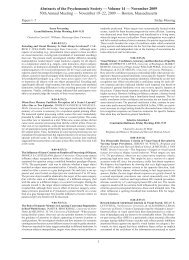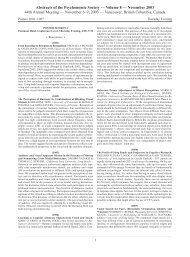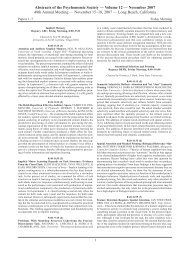Abstracts 2005 - The Psychonomic Society
Abstracts 2005 - The Psychonomic Society
Abstracts 2005 - The Psychonomic Society
Create successful ePaper yourself
Turn your PDF publications into a flip-book with our unique Google optimized e-Paper software.
Sunday Morning Papers 300–306<br />
Maggie Shiffrar)—Why do people demonstrate impressive visual sensitivity<br />
to human action? Visual expertise theories suggest that this<br />
sensitivity reflects a lifetime of experience watching other people<br />
move. Motor experience theories suggest the visual analysis of human<br />
movement selectively benefits from motor system contributions. To<br />
test these theories, naive observers performed a series of identity discrimination<br />
tasks. Observers viewed point-light displays of actions<br />
performed by themselves (with which they have the most motor experience),<br />
their friends (most visual experience), or matched strangers<br />
(baseline condition). On each trial, participants viewed two actions<br />
and reported whether the actions were performed by the same actor<br />
or two different actors. Across studies, participants demonstrated the<br />
greatest visual sensitivity to their own movements. Friends’ actions<br />
were discriminated at above-chance levels. Performance was viewpoint<br />
and action dependent. <strong>The</strong>se results suggest that both motor experience<br />
and visual experience define visual sensitivity to human<br />
movement.<br />
Emotion and Memory<br />
Grand Ballroom Centre, Sunday Morning, 10:20–12:00<br />
Chaired by Janet Metcalfe, Columbia University<br />
10:20–10:35 (300)<br />
Memory Under Stress: <strong>The</strong> Case of First-Time Parachute Jumping.<br />
JANET METCALFE & BRIDGID FINN, Columbia University—<strong>The</strong><br />
memorial effects of traumatic levels of stress are difficult to assess because<br />
of ethical considerations. However, the stress levels during firsttime<br />
parachute jumping approach those of trauma. A series of memory<br />
tests were, therefore, administered to first-time jumpers. <strong>The</strong><br />
results of these tests will be discussed in terms of the hot/cool framework<br />
of memory and emotion.<br />
10:40–10:55 (301)<br />
“Remembering” Emotional Words Is Based on Response Bias Not<br />
Recollection. SONYA DOUGAL, New York University, & CAREN M.<br />
ROTELLO, University of Massachusetts, Amherst (read by Caren M.<br />
Rotello)—Recent studies have demonstrated that emotion modulates<br />
recognition memory by increasing the proportion of remember judgments<br />
to emotional stimuli (Kensinger & Corkin, 2003; Ochsner,<br />
2000). This finding has led to the claim that recognition memory for<br />
emotional stimuli depends largely on a recollective process. We present<br />
ROC data from two experiments that challenge this conclusion. In<br />
both experiments, subjects studied and received a recognition test for<br />
neutral and emotional words. At test, subjects gave confidence ratings<br />
that each item had been studied. In Experiment 2, we also collected<br />
remember/know judgments. Three models were fit to individual subjects’<br />
data: a one-dimensional familiarity-based model (Donaldson,<br />
1996), the dual-process model (Yonelinas, 1994), and STREAK<br />
(Rotello et al., 2004). In accord with the literature, we find that emotion<br />
increases subjective reports of “remembering.” However, the effect<br />
is due to response bias differences rather than sensitivity change<br />
or use of a high-threshold recollection process.<br />
11:00–11:15 (302)<br />
<strong>The</strong> Effect of Mood on Implicit Motor Sequence Learning. JANET E.<br />
PALMER, GERALD L. CLORE, & DANIEL T. WILLINGHAM, University<br />
of Virginia (read by Daniel T. Willingham)—We used music<br />
to induce a happy or sad mood and observed the effect on implicit sequence<br />
learning using the serial response time task. During training,<br />
a sad mood led to overall faster performance, but a happy mood led<br />
to more robust implicit sequence learning. After training, participants<br />
listened to music designed to bring them back to a baseline mood and<br />
then completed a probe of their learning. Once the effect of mood was<br />
reversed, the difference in learning disappeared, which indicated that<br />
mood affected the expression of implicit learning, but not learning itself.<br />
<strong>The</strong> results are interpreted as supporting the mood-as-information<br />
hypothesis.<br />
47<br />
11:20–11:35 (303)<br />
Emotion-Linked von Restorff and Interference Effects in Immediate<br />
Memory: Arousal Versus Priority-Binding Mechanisms. DONALD<br />
G. MACKAY & CHRISTOPHER H. HADLEY, UCLA—Binding theory<br />
(MacKay et al., 2004) predicts three emotion-linked effects in immediate<br />
recall of taboo versus neutral words: (1) a von Restorff effect for<br />
taboo words presented slowly (2,000 msec/word) in mixed taboo-neutral<br />
lists—that is, better recall of taboo words and their immediately adjacent<br />
neutral words relative to position- and familiarity-matched neutral words<br />
in unmixed lists; (2) equivalent recall of taboo and neutral words in<br />
unmixed lists presented at fast or slow rates; (3) encoding interference<br />
that impairs recall of neutral words in comparison with taboo words<br />
in rapidly presented (200 msec/word) mixed lists—because emotion<br />
triggers binding mechanisms for encoding context of occurrence,<br />
taboo words impair the encoding of prior and subsequent neutral<br />
words in rapidly presented mixed lists as a result of emotion-linked<br />
capture of the mechanisms for binding list context. Our data supported<br />
all three predictions, suggesting that time-limited binding processes,<br />
rather than arousal or rehearsal processes triggered by taboo words,<br />
underlie our von Restorff effect.<br />
11:40–11:55 (304)<br />
Working Memory and Emotion: Ruminations on a <strong>The</strong>ory of Depression.<br />
ALAN D. BADDELEY, University of York—A number of<br />
theories of emotion implicate working memory as a link between physiologically<br />
based emotions and psychologically experienced feelings.<br />
<strong>The</strong> Baddeley and Hitch multicomponent model of working memory<br />
can account for the effects of fear and anxiety in terms of the distracting<br />
effects of worry. Depression presents a greater problem. A possible<br />
solution is proposed in terms of a hedonic detector system based on<br />
physiological, possibly visceral information that then feeds into a comparator<br />
when choices are required. <strong>The</strong> detector depends on a neutral<br />
point which may be influenced genetically, environmentally, or pharmacologically.<br />
Depression is assumed to reflect on inappropriate setting<br />
of this neutral point. Working memory is required for storage within the<br />
comparator and for the direction and control of the detection system.<br />
Methods of testing the model empirically will be discussed.<br />
Category Learning<br />
Grand Ballroom East, Sunday Morning, 10:20–12:00<br />
Chaired by Ben R. Newell, University of New South Wales<br />
10:20–10:35 (305)<br />
Challenging the Role of Implicit Processes in Probabilistic Category<br />
Learning. BEN R. NEWELL, University of New South Wales, & DAVID<br />
A. LAGNADO & DAVID R. SHANKS, University College London—<br />
Considerable interest in the hypothesis that different cognitive tasks<br />
recruit qualitatively distinct processing systems has led to the proposal<br />
of separate explicit (declarative) and implicit (procedural) systems. A<br />
popular probabilistic category learning task known as the “weather<br />
prediction task” is said to be ideally suited to examine this distinction<br />
because its two versions—“observation” and “feedback”—are claimed<br />
to recruit the declarative and procedural systems, respectively. In two<br />
experiments, we found results that were inconsistent with this interpretation.<br />
In Experiment 1, a concurrent memory task had a greater<br />
detrimental effect on the putatively implicitly mediated (feedback) version<br />
than on the explicit (observation) version. In Experiment 2, participants<br />
displayed comparable and accurate insight into the task and<br />
their judgment processes in both the feedback and observation versions.<br />
<strong>The</strong>se findings have important implications for the study of<br />
probabilistic category learning in both normal and patient populations.<br />
10:40–10:55 (306)<br />
Regulatory Focus and Flexibility in Classification. ARTHUR B.<br />
MARKMAN, GRANT C. BALDWIN, & W. TODD MADDOX, University<br />
of Texas, Austin—We explored the influence of regulatory fit<br />
on category learning. Regulatory focus theory suggests that people





